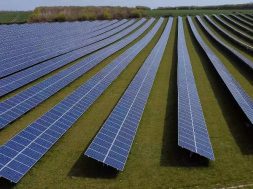
In jobs push, PM prioritises solar gear manufacture, drives ethanol blending
Prime Minister Narendra Modi has emphasised that manufacturing of solar equipment should be given priority to drive employment generation. In an official statement after a meeting to review the progress of Petroleum and Natural Gas, Power, Renewable Energy and Housing sectors, Modi also said that setting up of second generation bio-ethanol refineries should be expedited, to utilise agricultural residues for this purpose. While the installed capacity addition of solar energy has been growing exponentially, a major portion of the equipment is imported. The government has targeted an indigenous manufacturing capacity of 4-5 GW by 2020 under the National Solar Mission. Till the end of December 2016, the country’s installed solar cell manufacturing capacity stood at 2,953 MW. Comparably, the government has targeted reaching a installed solar power manufacturing ability of 100 GW.
Modi also said that ethanol manufacturing needs to be ramped up to meet the rising demand. BusinessLine had reported in March that the country will miss the 10 per cent blending target set by the Ministry of Petroleum and Natural Gas in the past financial year. The national supply data revealed that only 78 crore litres of ethanol have been committed for supply to OMCs in the current financial year. This is nearly 30 per cent lower than the 111 lakh litres contracted in fiscal 2015-16.
PM Ujwala Yojana
The Pradhan Mantri Ujjwala Yojana scheme was discussed at the meeting. It said that the scheme has benefited 1.98 crore below poverty line households so far. The contribution of gas to the primary energy mix has risen to 8 per cent and 81 cities are being covered under City Gas Distribution networks. Regarding the rural electrification programme, it was noted that over 13,000 villages were electrified out of a total of 18,452. Over 22 lakh rural BPL households were electrified in 2016-17, and over 40 crore LED bulbs were distributed in the same period. The total inter-regional transmission capacity has been significantly enhanced, with 41 GigaWatts transmission capacity being added from May 2014 to April 2017.
Total renewable generation capacity has crossed 57 GigaWatts, with an increase of 24.5 per cent being registered in the last fiscal year. The capacity addition in solar energy in fiscal 2017 was the highest-ever, at 81 per cent. The statement also said that solar and wind tariffs have now achieved grid parity, with rates well below ₹4 per Kilowatt-Hour.
Housing scheme
During financial year 2016-17, over 32 lakh houses were completed in rural areas under the Pradhan Mantri Awaas Yojana. The statement said that IT and space-based applications are being used to monitor progress of the scheme. The Prime Minister enquired about the training and skills being given to rural masons, who were involved with this scheme. Modi also said that he seeks a consolidated approach to schemes, such as electrification, IT networks and housing. He called for a focused approach on the 100 worst performing districts in each case. He directed that future reviews should focus on problems at the district-level.














